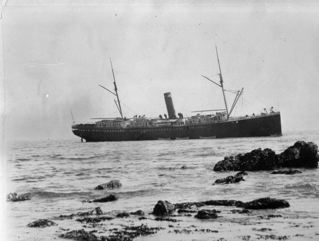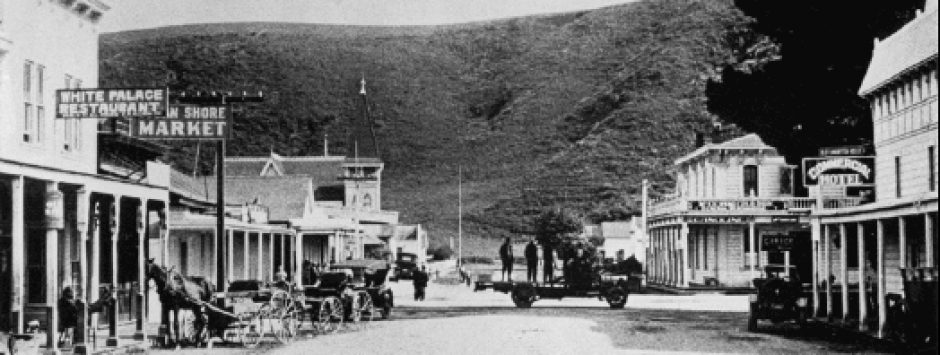

Story by John Vonderlin
Email John ([email protected])
COLOMBIA COVE’S WRECK
The Undoing of a Stranded
Liner Viewed by Crowds
of Sightseers.
Souvenir-Hunters Besiege the Vessel
in Search of Relics of the
Disaster.
ON BOARD STEAMSHIP COLOMBIA,
ashore off Pigeon Point Light (via Pesca –
dero, Cal.), July 18.―The wrecking of the
steamer goes on, though tbe bay (they
call it Colombia Cove now) is calm and
the breakers stilled. The ship’s people
know that at any time the waves from a
local blow, or a mountainous swell boating
in from some far off gale will drive tbe
crew ashore and finish the work of the
reef.
Everything that can be moved and re –
moved to the schooners alongside is
wrenched and torn from its fastenings and
hoisted over tbe rail with the still useful
donkey-engine.
That donkey-machine has immortalized
itself. While the great main engines of
the ship lie dead and corroding under
water, the donkey-boiler, perched above
the sea, is in action, and Fireman Collins
is the sooty Casablanca who stays by the
furnace.
When the tide registers high on the
liter-marks on the bulkhead and his fire
sizzles out he drops his shovel, washes his
face in the flood that chases him from his
post and goes up the ladder. Though Col –
lins is a king in a small way. he can stay
the sea no more than did Canute ages ago;
but he gets a good head of steam on before
the water laps over the gratebars and the
faithful “donkey” runs until the tide falls.
Then Collins again starts his fire and lor
a season defies the waves.
One of the foremost laborers in the work
of stripping the steamer is Ship-Carpenter
Wheaton. He assisted in building the
Colombia and is now engaged in undoing
his work. With chisel and crowbar he
ruthlessly wrenches mirrors, desks, wash –
stands, racks and lamps from their places
and tosses them out onto the deck to be
hoisted aboard the awaiting schooners.
He removed the piano from the saloon
yesterday, but with more care than he be –
stows on his other plunder. There are
three other pianos down in the flooded
hold.
The only idle person aboard the Colom –
bia is Customs Inspector O’Leary, who is
here to see that nothing dutiable washes
out through the holes in tie hulk without
his chalkmarks thereon. As he has no
diving suit he is unable to get down into
the hold and prevent the landing of the
cargo, and consequently he is in a quan –
dary. He trusts that Deputy Collector
Bam Rudell will understand the situation.
The only foreign importations that have
escaped him thus far are about 40,000,000
limes that have gone bobbing merrily one
by one through the breakers to the beach
without permission lrom the Treasury
Department. Inspector O’Leary has missed
several cases of men’s trousers from the
ship, which have gone out through the
shattered bottom and have disappeared.
The souvenir fiend has come down upon
the helpless ship. Every article worthless
for practical uses has been picked up,
whether floating or beached, and borne
away to be exhibited in after years as a
memento of Colombia Cove’s last victim.
One woman tourist from Boston found on
the beach a sardine can which Joe Levy of
Pescadeo had thrown away after eating its
contents on the bluff the day before.
An old gentleman hailing from Belve –
dere secured a driftinc beer-bottle and
carried it away in triumph, nor recogniz –
ing it as having accompanied him to the
locality that morning. A sweet Stanford
co-ed risked her life snatching from the
salt sea waves a pocket-comb which her
escort, a football savage, had lost. He
had been combing his long, Samsonian
tresses behind a rock a la mermaid and
had dropped it overboard.
The country swarms with midsummer
campers and the shipwreck is an addi –
tional attraction for them. They come
down tbe beach, sit on the rocks and take
in the marine drama, with the poor Colom –
bia occupying the center of the stage. A
bright sun lights the scene, and the or –
chestral breakers play an eternal mono –
chord. Other ships pass and repass tbe
little bay. gliding smoothly over the quiet
sea, and their freedom makes the condi –
tion of their luckless sister, bound as she
in to a rock, all the more pitiable.
“I was listening to the Ano Nuevo fog
signal sounding off the starboard quarter,
and had not the slightest idea ol danger,”
said Captain Clark to-day, in discussing
the recent disaster. “I was sure that it
was the Pigeon Point warning, and as it
sounded so indistinct in the thick fog I
believed it was miles astern, and so kept
on, with this result. What was my sensa –
tions when I felt the reef?
“Well, it was as if a knife was going
through me. I did not know where I was,
and the shock of finding myself on the
rocks, when I thought myself well at sea,
bewildered me for a few seconds. Then I
thought of the passengers and crew; of
myself I had no thought, except that I
desired to go down on those rocks and be
ground to fragments with my ship.
“I have sailed probably six times a year
for six years out yonder, going up and
down this coast. I knew that this was a
spot to shun, and that it was the burial
place of several vessels that had wandered
in too near the reefs. Can you not im –
agine how anxious I was when the fog
came down upon me, and a danger signal
horn on shore was sounding? I never
THE SAN FRANCISCO CALL, SUNDAY, JULY 19, 1896.
heard the Pigeon Point signal, though it
was so near. If I had caught a note of
that whistle, how quickly I would have
steered for the open ocean, and have pre –
vented this,” and the captain motioned
toward the hull that reeled uneasily
beneath our feet.
“This is my first mishap and no one can
know how it takes me,” he continued.
“My wife and my daughter, the latter of
whom has just graduated from the uni –
versity, are in Massachusetts. They will
immediately return; their pleasant visit –
ing is quickly brought to an end.
But I have one consolation, and that
is that no lives were lost. There is no sad –
ness in any home but my own. I wish
this vessel could be saved. She is too
good a ship to be lost. She was so perfect
in every way that every one who sailed in
her became attached to her.
“Even now the Colombia could be saved
if the proper appliances were at hand.
The water is deep around the narrow ledge
of rocks on which she lies so easily. Ves –
sels, lighters, pontoons of any draught
could be moored alongside of her and her
hull lifted clear. If she had gone ashore
within forty miles of New York or any
large Atlantic seaport she would not have
been abandoned to become a scrap-iron
heap on the beach. When somebody pro –
vides a modern and effective wrecking
outfit the Pacific coast will cease to be a
graveyard for ships.”

